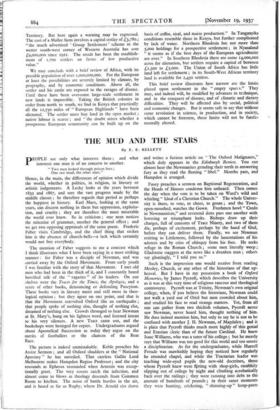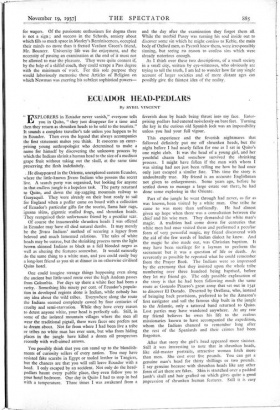THE MUD AND THE STARS
By E. E. KELLETT
PEOPLE see only what interests them ; and what interests one man is of no concern to another. " Two men looked through prison bars ;
One saw mud, the other stars."
Hence, in the main, the differences of opinion which divide the world, whether in politics, in religion, in literary or artistic judgements. A Lecky looks at the years between 183; and 1867, and sees the vast progress made by the middle classes ; he therefore regards that period as perhaps the happiest in history. Karl Marx, looking at the same years, can discern nothing in them but oppression, exploita- tion, and cruelty ; they are therefore the most miserable the world ever knew. So in criticism ; one man notices the minutiae of grammar, another the general effect ; and we get two opposing appraisals of the same poem. Frederic Faber visits Cambridge, and the chief thing that strikes him is the absence of church-bells--a lack which certainly would not fret everybody.
The mention of Faber suggests to me a contrast which I think illustrates what I have been saying in a most striking manner : for Faber was a disciple of Newman, and was carried away by the Oxford Movement. From early youth I was familiar with the story of that Movement. I met old men who had been in the thick of it, and I constantly heard horrified talk of the " vagaries " of its leaders. On our shelves were the Tracts for the Times, the Apologia, and a score of other books, denouncing or defending Puseyism. These books vary in literary merit and still more in theo- logical opinion ; but they agree on one point, and that is that the Movement convulsed Oxford like an earthquake ; that people spoke of nothing else, thought of nothing else, dreamed of nothing else. Crowds thronged to hear Newman at St. Mary's, hung on his lightest word, and listened intent to his very silences. A new Tract came out, and the bookshops were besieged for copies. Undergraduates argued about Apostolical Succession as today they argue on the merits of footballers or the chances of the Boat Race.
The picture is indeed unmistakable. Keble preaches his Assize Sermon ; and all Oxford shudders at the " National Apostasy " he has unveiled. That careless Gallio Lord Melbourne makes Hampden Regius Professor; and the city resounds as Ephesus resounded when Artemis was excep- tionally great. The very scouts catch the infection, and almost come to blows as theology descends from Common Room to kitchen. The noise of battle hurtles in the air, and is heard as far as Rugby, where Dr. Arnold sits down and writes a furious article on " The Oxford Malignants," which duly appears in the Edinburgh Review. You can almost hear the Newmanites grinding their teeth in answering fury as they read the flaming " libel." Months pass, and Hampden is avenged.
Pusey preaches a sermon on Baptismal Regeneration, and the Heads of Houses condemn him unheard. Then comes the day when the vote is to be taken on Ward's wild and whirling " Ideal of a Christian Church." The whole Univer- sity is there, to vote, to cheer, to groan ; and the Town, open-mouthed, watches the Gown. Freshmen howl " Credo in Newmannism," and reverend dons pass one another with lowering or triumphant looks. Bishops draw up their charges, full of censures of Tract Ninety, and two of them die, perhaps of excitement, perhaps by the hand of God, before they can deliver them. Finally, we see Newman retiring to Littlemore, followed by the lamentations of his adorers and by cries of obloquy from his foes. He seeks refuge in the Roman Church ; some men literally weep ; Gladstone staggers at the news like a drunken man ; others say gloatingly, " I told you so."
Such is the impression one would receive from reading Mozley, Church, or any other of the historians of that up- heaval. But I have in my possession a book of Oxford Memories, by James Pycroft, which describes the University as it was at this very time of religious rancour and theological controversy. Pycroft was at Trinity, Newman's own original college, when, if you believe the historians, Newman could not walk a yard out of Oriel but men crowded about him, and studied his face to read strange matters. Yet, from all one can gather from two thickish volumes, Pycroft never saw Newman, never heard him, thought nothing of him. He does indeed mention him, but only to say he is not to be confused with another J. H. Newman, of Magdalen ; and it is plain that Pycroft thinks much more highly of this genial and Erastian cleric than of the future Cardinal He knew Isaac Williams, who was a tutor of his college ; but he merely says that Williams was too good for this world and too severe a disciplinarian. As for the undergraduates, while Hurrell Froude was mawkishly hoping they noticed how regularly he attended chapel, and while the Tractarian leader was teaching wide-eyed pupils the new-old doctrines, those whom Pycroft knew were flirting with shop-girls, stealthily slipping out of college by night and climbing acrobatically back over the railings ; they were running into debt to the amount of hundreds of pounds ; in their saner moments they were hunting, cricketing, " shinning-up " lamp-posts for wagers. Of the passionate enthusiasm for dogma there is not a sign ; and success in the Schools, anxiety about which fills so much space in Mozley's Reminiscences, occupied their minds no more than it fretted Verdant Green's friend, Mr. Bouncer. University life was for enjoyment, and the necessity of passing an examination at the end of it must not be allowed to mar the pleasure. They were quite content if, by the help of a skilful coach, they could scrape a Pass degree with the minimum of work. For this sole purpose they would laboriously memorise those Articles of Religion on which Newman was exerting his subtlest sophistical powers— and the day after the examination they forgot them all. While the morbid Pusey was turning his soul inside out to discover some sin which he might confess to Keble, the main body of Oxford men, as Pycroft knew them, were irresponsibly sinning, but seeing no reason to confess sins which were already notorious enough.
As I think over these two descriptions, of a small society in a small city, written by eye-witnesses, who obviously are trying to tell the truth, I am led to wonder how far any single account of larger societies and of more distant ages can possibly give the faintest idea of the reality.

















































































































 Previous page
Previous page